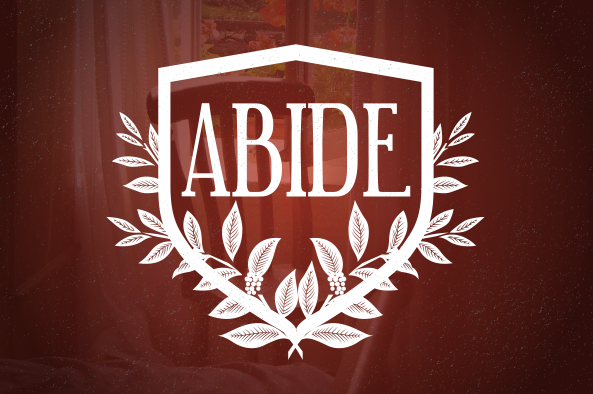Clearly focus on a "rule of life"
My friend and brother Jeremy Linneman has written more deeply and carefully about the “Rule of Life” concept than I ever could here. Be sure to read his article; my words are meant to dialogue with his and describe a few things that have occurred to me as I’ve pondered his writing. The elders believe we would all benefit from writing a rule of life; hopefully, these articles encourage you to see that exercise as both fruitful and very achievable.
Finding room for rules
No matter how great, any concept with the word “rule” in it automatically starts the game down a couple touchdowns.
Few words raise the hairs on the back of our neck like “rules.” At best, we see them as something to be learned – so that, later, we can break them. At worst, they are the refuge of fools, dictates people follow because they don’t have the imagination to invent their own way of life - or the guts to get out from under someone else’s thumb.
We are especially suspicious of rules when they’re tangled up with religion. Perhaps we’ve seen church authority abused; or we’ve watched as rules have been bent into a sort of salvation, enslaving those desperate for the taste of grace, chaining them to a hamster wheel of righteousness that never actually gets them anywhere.
I believe the spiritually mature should find room for rules - after all, 1 John 5 reminds us that we show our love for God by obeying his commandments, which are not burdensome but life-giving. But writing a rule of life is not about creating rules for life. It is, instead, to ask, “What will my life be ruled by?”
Making choices
The first sin – which we read about in Genesis 3 – is discarding God’s reign and choosing to be ruled by our own wits and ambitions. We know how well that turned out – we all bear the brunt of that choice every day. We all make that choice ourselves over and over again.
Rediscovering and recovering the good rule of God is what Christ died to do. It is what we participate in daily as we lean on God for power to walk obediently in and toward sanctification.
Writing a rule of life is a significant step towards choosing the things God originally designed us for: fellowship and flourishing, meaningful work and life-giving relationships. Rightly considered and valued, these are glorious things that grant us measures of grace and help us know him better. Writing a rule of life is saying we want our lives to be structured in such a way that make these activities possible and worthwhile.
As my wife, the planner, has lovingly reminded me, the procrastinator, not choosing is often the same thing as making a choice. If we want to live lives that are going somewhere – hopefully toward the ultimate, that is, progressively enjoying and growing to look more like Christ – we will have to make hard choices between better and best, between treading water and swimming in the depths of God’s goodness.
To not choose abiding through the spiritual disciplines is to choose anxiety; failing to carve out space for life-giving relationships is a vote for shuttling back and forth between anyone who calls our names, never knowing or being known deeply. Not choosing things that accompany and promote God’s rule is choosing to be an inch deep in nearly every aspect of our life and to have our souls stretched thin across a mile.
Restoring balance
Each of the elders has confessed living this sort of over-extended life. It is not that we’ve forgotten God rightly rules; but we have inched away from what is important to the point that our lives are ruled by keeping up and keeping our heads above water, not by important rhythms of rest and work and practicing the presence of God.
This rule of life exercise has given us language for our longings. It has put in words and priorities and items etched onto our calendars a sense of what we have lost and what we hope to recover. Pouring over our rules of life together has helped us see that a life springing from – and balanced by – the priorities of the gospel is possible. But it must be fought for. It must be chosen again daily as we die to our own rule and embrace Christ’s.
Here’s another, more sobering way to think about it: If you and I did the math, we would probably be shocked and depressed by how few minutes and hours we have left. What do we want to spend them in service of? What sort of state do we want our hearts to be in? What earthly joys and heavenly practices can we engage in now with an eye toward enjoying them perfectly later?
Digging in together
One last thing we must consider: What do we want the church to be ruled by? My friend Jeremy helps us think through this:
“It follows that when an entire community fails to practice intentional centering on God and his word, it becomes stagnant, unfruitful and even hazardous to its members.”
We know that no matter what the children’s rhyme says, the church is the people, not the building or the steeple. We hear in Proverbs 29 that where there is no vision, the people perish. There has been much conversation about what that verse means and how it is applied.
Still the imagery rings true. Perish might be a strong word but each of us, at some time, has seen that without a vision for the good life, the life ruled by God, the people shrivel up. Their spiritual lives become shells of what they want.
Karis, do we have a vision for the sort of people we want to be? For the things we want to be ruled by? Then let us sift every part of our life and dig with dirt under our fingernails until we find the true treasures of God and this life. Let’s be people who are willing to put on paper, and then into practice, the disciplines and values and relationships that will help us see with clearer focus who God is and the mission that he has purposed for us.

This post was written by Aarik Danielsen. Aarik serves as a lay elder in Karis Church, preaching the word, leading worship, and shepherding God’s people. He is married to Brooke.


